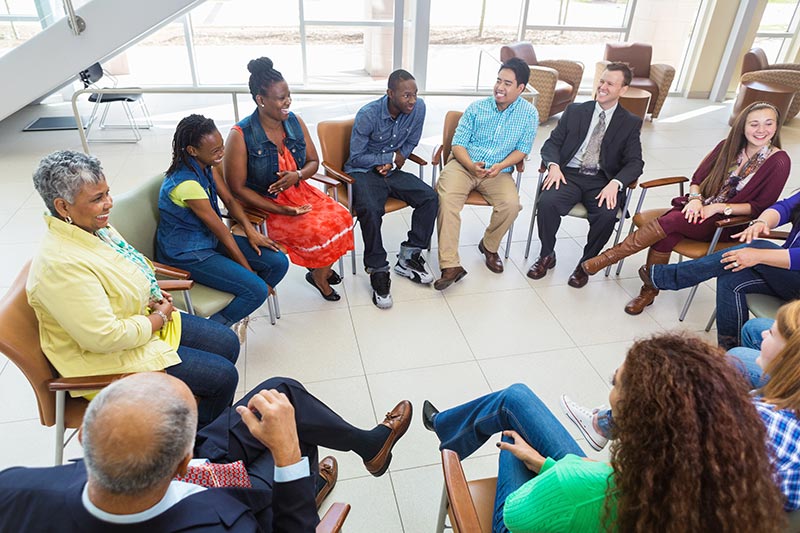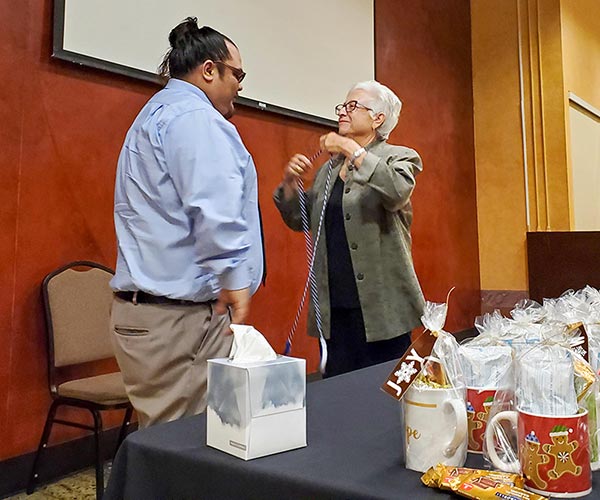
The Orange County Day Reporting Center’s restorative justice program is about more than just getting participants to take responsibility for the criminal offense they committed. It’s about preventing recidivism through rehabilitation of the individual, via a combination of group discussion and self-reflection, said program instructor Beverley Campbell.
Retributive Justice vs. Restorative Justice
“Retributive justice is when the offender is punished for the purpose of controlling criminal behavior, but restorative justice is when the offender is not punished, but rehabilitated, to help prevent future criminal behavior and to repair the harm caused by that behavior,” said Campbell, who is a retired business owner in the community and teaches the weekly class at the Santa Ana, California-based non-residential reentry center.
The problem with retributive justice, is that the victim is completely lost in the process, said Campbell. “Nobody acknowledges that a wrongdoing has taken place, and the justice system takes over at start of the process. Also, the more responsibility an offender takes, the harder the system will come down on them.”
But the restorative justice process is one that can dramatically transform people, relationships and communities. In a system of restorative justice, said Campbell, “the object is getting the offender to admit to the wrongdoing, and then figuring out how to get them to where they won’t do it again,” because they know who was harmed and how much.
Program Structure and Content

At the Orange County DRC, every week for nine weeks, a group of about 15 program participants, all of whom volunteer to take part, sit in a circle for an hour and a half and tackle a different curriculum topic, each designed to help them understand the life circumstances that led them to where they are now. Those who participate in this honors class tend to be at a stage in their lives where they want to make a change.
Class time is used to discuss participants’ personal motivations and feelings; trauma from their past, like a dysfunctional childhood; and their personal belief systems. Participants also discuss the impact on the victim, as well as the negative effect their crime has had on their family, their community and themselves.
“We cover many topics and touch on a lot of things,” she said. “Some things will hit one person more than another.” Campbell added that, for privacy reasons, she is not permitted to ask participants about their crimes, and the victims do not take part, although they often do in other similar programs.
Throughout the program, participants are encouraged to accept responsibility for those they hurt, while also exploring the circumstances that led them to commit the criminal offense. Participants feel guilty, said Campbell, but they also become enlightened.
“When a crime has been committed, harm has been done to victim first of all, but apart from that, there is also harm done to offender, to their family and to the community,” said Campbell. “What I explore in this class is all the areas where this harm has taken place. It can come as quite a surprise to the offender when he or she learns all the different tentacles involved.”
Restorative Justice Moves Negative to Positive
What makes the program so effective for participants is its interactive element: the ability to share thoughts and experiences their peers, said Campbell.
“During the course, I acknowledge that I’m not in their position. It doesn’t have to be a case of ‘old white woman says,’” said Campbell. “What I do, though, is I lay out facts and information and examples. And when they hear other participants in their same situation talking about their lives and confirming some of the facts that I’ve been giving them, it really hits home.”
Campbell said she initially got the opportunity to teach the program for GEO Reentry Services while visiting prisons and reentry centers through her church’s ministry program. More than 10 years ago, she developed the DRC course with help from friends in the restorative justice and psychology fields.
The concept of restorative justice is also well-aligned with the core mission of GEO Reentry Services as a whole, added Campbell: to bring something positive to the community out of something negative.
